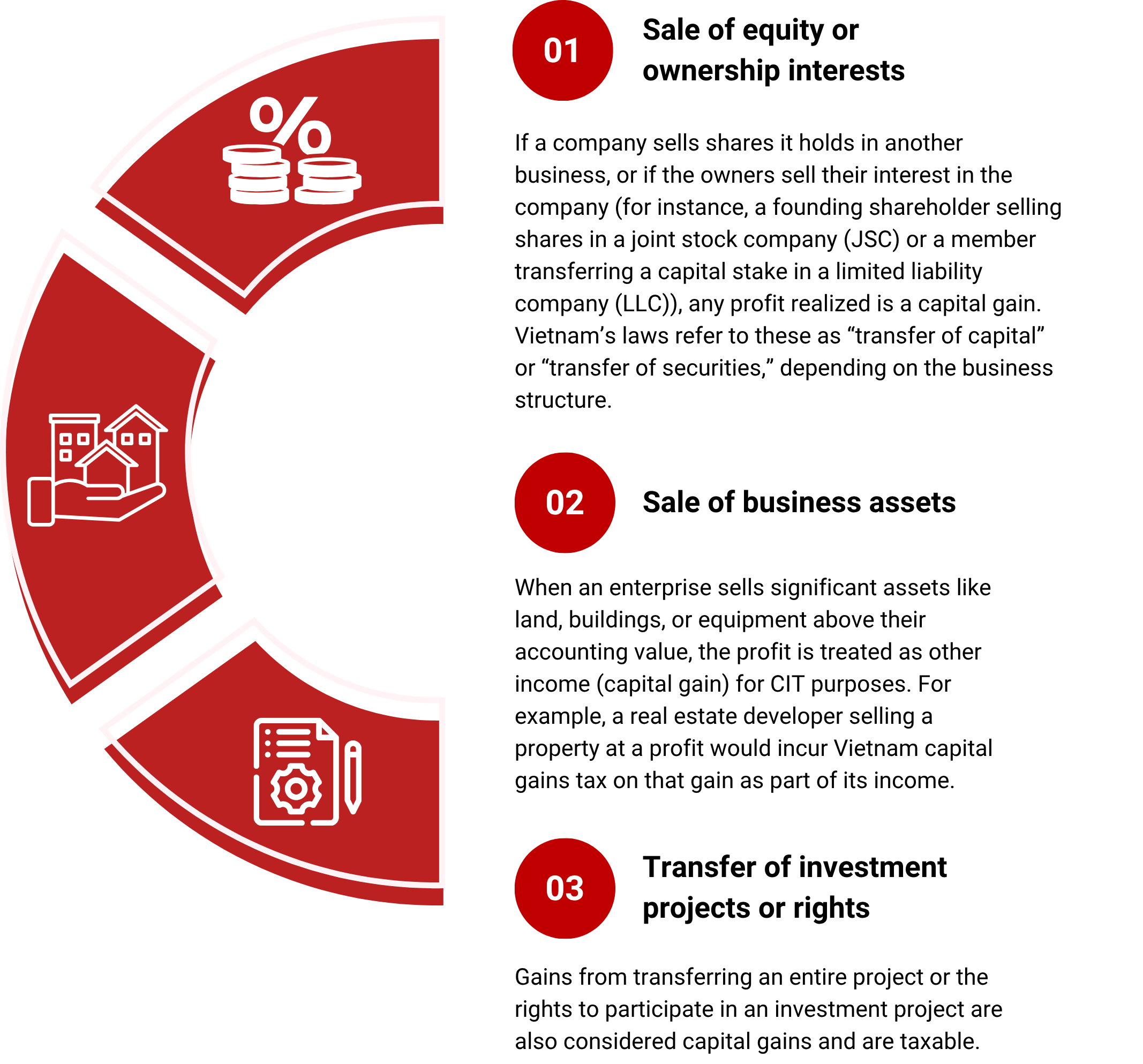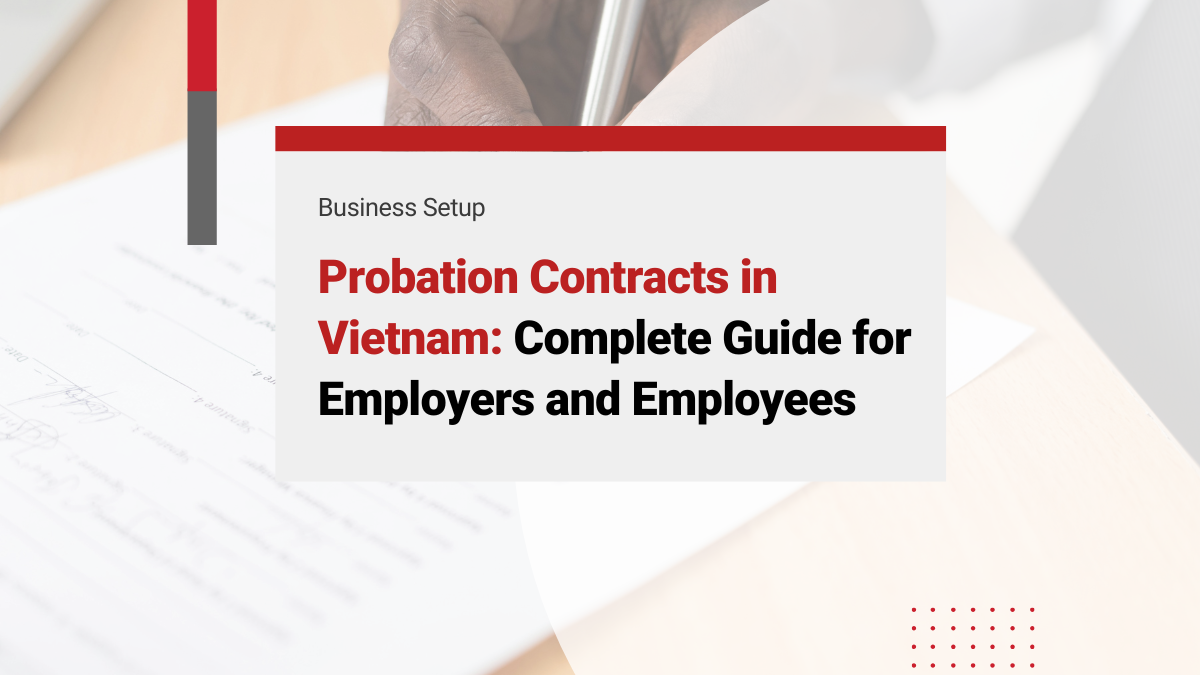Vietnam’s tax reforms in 2025 bring notable changes for businesses.
Vietnam’s 2025 tax reforms have introduced key updates for businesses, especially regarding the Vietnam capital gains tax. From local SMEs to foreign-invested startups, companies must understand the evolving tax rules. Rather than a separate capital gains tax law, Vietnam includes capital gains under corporate or personal income tax. This blog offers the latest insights on Vietnam capital gains tax for businesses, covering legal changes, incentives, and strategic planning tips.
Understanding Vietnam Capital Gains Tax for Businesses
In Vietnam, capital gains are profits from selling or transferring business assets like real estate, equipment, or company shares. For businesses, these gains are not taxed separately—instead, they fall under corporate income tax. The Vietnam capital gains tax is effectively the CIT applied to net gains (sale price minus cost and expenses), typically at the standard 20% rate for domestic companies. Understanding this helps businesses plan transactions and manage tax liabilities effectively.
What Qualifies as Capital Gains for Companies in Vietnam
Not all proceeds a business receives are treated as capital gains; Vietnam’s tax regulations specify what transactions generate taxable capital gains. Generally, a capital gain arises when a company or investor sells a capital asset for more than its book value or original purchase price. Typical scenarios include:

It’s worth noting that routine sales of inventory or goods/services are not “capital gains” – those are normal business revenue. Capital gains typically stem from one-time asset disposals or ownership transfers. Properly classifying a transaction is important because it determines how the tax is calculated and what obligations arise for reporting.
Discover how our Accounting & Bookkeeping Services help SMEs and FDIs stay compliant while reducing costs.
Taxation of Capital Gains Under Vietnam’s Corporate Tax System
Vietnam’s tax system integrates capital gains into the corporate income tax regime for companies. There is no separate capital gains tax law for businesses; instead, capital gains are taxed at corporate tax rates as part of a company’s taxable income. For domestic enterprises (Vietnamese tax residents), the standard CIT rate is 20%, which applies to profits including any capital gains. In other words, if a local company sells an asset or investment at a profit, that gain is added to its taxable income and taxed at 20% like ordinary profit.
For example, a startup that sells a piece of equipment at a gain or a Vietnamese company that divests a subsidiary would include the gain in its CIT calculation for the year. There is no additional Vietnam capital gains tax on top of CIT in such cases – the capital gain is simply part of the CIT assessment.
However, Vietnam’s tax rules distinguish between different types of sellers and assets, which affects how the tax is applied:
The key takeaway is that Vietnam capital gains tax for businesses is largely a function of CIT. Companies must calculate any gains from capital transactions and then apply the appropriate tax treatment. The exact mechanism (net gain vs. gross proceeds) and rate can vary based on the type of asset and the seller’s residency status, as explained further below.
Capital Gains Tax for Different Business Structures (LLCs vs. JSCs)
The impact of Vietnam capital gains tax can differ depending on a company’s legal structure and the nature of the ownership transfer:
- Limited Liability Companies (LLCs): In an LLC, owners hold “capital contributions” rather than shares. When an LLC sells a capital asset, the LLC itself pays CIT on any gain as usual. If an owner (corporate or individual) transfers their capital contribution to someone else, that transfer triggers tax on any gain from the perspective of the seller. A Vietnamese corporate owner selling its stake in an LLC would include the gain in its CIT (20%). A foreign corporate owner selling an LLC interest, prior to 2025, was taxed 20% on the gain, essentially treating it like business income. From 2025 onward, as we will see, foreign sellers face a new method (a flat tax on gross proceeds) for such transfers. Individual owners have their own personal income tax rules (Vietnamese resident individuals pay 20% on gains from LLC capital transfers, while non-resident individuals pay 0.1% on the proceeds), but our focus here remains on business entities.
- Joint Stock Companies (JSCs): JSCs issue shares, and transfers of shares can occur privately or on the stock exchange. If a JSC itself sells a capital asset (for example, a piece of land), any gain is taxed at 20% under CIT like any company. If a shareholder (corporate) sells shares in a JSC:
- For publicly listed JSCs, Vietnam imposes a small tax on the gross selling price of shares. Domestic companies selling shares may treat the gain as regular income (subject to CIT), but notably, foreign corporate investors selling listed shares have been subject to a 0.1% tax on gross proceeds for years. This low gross-rate tax on listed securities remains unchanged in 2025. It simplifies taxation of stock market transactions by taxing the transaction value instead of requiring calculation of profit.
- For private (non-listed) JSCs, transfers were historically treated similarly to LLC transfers. A Vietnamese corporate shareholder selling shares in a private JSC pays 20% CIT on the gain. A foreign corporate shareholder previously also faced 20% on net gain for private JSC share sales.
In summary, the business structure influences how capital gains tax is applied: transfers of LLC capital vs. JSC shares have had different tax treatments (net vs. gross methods), especially for foreign investors. After recent changes, which we’ll detail next, Vietnam is moving toward a more uniform approach for taxing these transactions for non-residents. Regardless of structure, any business or investor disposing of an interest in a Vietnamese company should identify the relevant tax rule – whether it’s the standard CIT on gains or a gross-proceeds tax – based on the type of entity and the seller’s profile.
Learn how we’re guiding clients through changes in tax laws in our article “A Complete Guide to Draft Corporate Income Tax Law in Vietnam.”
Recent Changes in 2025: New Rules and Incentives
Significant updates to Vietnam’s tax laws took effect on 1 October 2025, reshaping how businesses are taxed on capital gains. The Corporate Income Tax Law 2025, alongside Resolution 198/2025/QH15, introduced both tighter enforcement on foreign transactions and new incentives for SMEs and startups. Key changes to Vietnam capital gains tax include:
1. Flat 2% Tax on Foreign Investors’ Capital Gains
A major shift is the replacement of the 20% tax on net gains with a 2% flat tax on gross proceeds for non-resident companies. This applies to direct or indirect transfers of stakes in Vietnamese LLCs or private firms. Even if the sale is made at a loss, foreign sellers must pay 2% of the sale price. Publicly traded shares remain subject to the existing 0.1% tax on gross proceeds. Internal group restructurings with no change in ultimate ownership may be exempt. This move simplifies tax collection but raises the effective Vietnam capital gains tax burden for low-margin or loss-making exits.
2. Lower CIT Rates for SMEs
To boost small business growth, Vietnam now offers reduced CIT rates:
- 15% for micro-enterprises (revenue ≤ VND 3 billion)
- 17% for small enterprises (VND 3–50 billion)
These rates apply to all taxable income, including capital gains—effectively reducing the Vietnam capital gains tax burden for qualifying SMEs.
3. Tax Holidays for Startups and New SMEs
Newly established SMEs enjoy a 3-year CIT exemption from registration. Certified “innovative startups” receive a 100% CIT holiday for 2 years, followed by a 50% reduction for 4 years. Gains realized during these tax-free periods are not subject to Vietnam capital gains tax, offering meaningful early-stage savings for tech-driven or R&D-heavy ventures.
4. Capital Gains Tax Exemption for Startup Investors
Investors who sell shares or capital in recognized innovative startups are now fully exempt from CIT and PIT on those gains. This landmark incentive aims to attract venture capital and improve investor returns. To benefit, the startup must hold official “innovative” status, and transactions must be clearly structured to qualify.
Implications for Domestic vs. Foreign-Owned Businesses
Domestic Businesses
Vietnamese companies continue to be taxed on capital gains under standard CIT rules. The Vietnam capital gains tax burden (effectively 20% CIT) remains unchanged, but new incentives offer significant relief:
- SMEs may benefit from reduced CIT rates of 15% or 17%.
- New businesses enjoy a 3-year tax holiday.
- Innovation-related income can be exempt for up to 3 years.
Additionally, the 2025 CIT Law allows companies to offset capital losses from real estate or project transfers against other taxable profits—previously restricted. This is especially helpful for firms in real estate or infrastructure sectors. Tech startups should proactively register for innovation tax status to reduce future Vietnam capital gains tax exposure on exits. In short, domestic firms now operate in a more favorable tax environment with enhanced flexibility and targeted relief.
Foreign-Owned Businesses
Foreign investors face a stricter regime. As of October 2025, a 2% tax on gross proceeds applies to most sales of equity in Vietnamese entities—regardless of profit or loss. This replaces the previous 20% net gain method and applies to both direct and indirect transfers (e.g. selling shares in offshore holding companies with underlying Vietnamese assets). This broadens Vietnam’s ability to tax foreign capital gains and makes tax planning essential.
While the new rules offer certainty and enforceability, they may increase tax costs for low-margin exits. Strategic investors who actively manage the Vietnamese business may still qualify for net taxation—but clarity is limited. Vietnam’s tax treaties can also offer relief for eligible investors, particularly where gains do not relate to immovable property. However, treaty relief must be requested in advance.
Actionable Insights for Managing Vietnam Capital Gains Tax
Effective planning can help businesses and investors minimize surprises and optimize their position under the evolving Vietnam capital gains tax rules. Here are four key strategies:
1. Maintain Strong Documentation
For resident companies taxed on net gains, it’s critical to keep detailed records of asset purchase costs, improvements, and transaction expenses. This supports accurate cost-basis calculations and helps reduce taxable gains. Even though foreign sellers may now be taxed on gross proceeds, any situation still taxed on net profit (e.g. foreign entities with a permanent establishment) benefits from proper documentation. To avoid disputes, ensure transactions are at arm’s length and supported by third-party valuations—Vietnam’s tax authorities may reprice deals if they suspect avoidance.
2. Leverage Incentives and Exemptions
Startups and SMEs should actively pursue available tax breaks. New SMEs may qualify for a 3-year CIT exemption, and recognized innovative startups can unlock CIT holidays and investor exemptions. Certification often requires proving tech ownership or qualifying business models, but the upside—potentially zero Vietnam capital gains tax on early exits—is substantial. Established companies should also explore R&D-related deductions and innovation income exemptions, which can offset broader taxable income, including capital gains.
3. Structure and Time Exits Carefully
Foreign investors should consider restructuring within their corporate group before selling, as internal transfers without ownership change may be exempt. However, the rules are narrow and require documentation. Where applicable, review Vietnam’s tax treaties early—some may reduce or eliminate Vietnam capital gains tax, especially for offshore transactions. Domestic firms should align capital gains with other operational losses to benefit from new offset provisions, or frontload deductible expenses in high-gain years to ease the tax burden.
4. Stay Compliant with Reporting Obligations
Capital transactions often require prompt tax filings. In deals involving foreign sellers, the Vietnamese entity or buyer typically must withhold and remit the applicable tax—usually within 10 days of transfer. Clarify responsibilities upfront to avoid penalties. With heightened enforcement under the 2025 rules, professional tax guidance is highly recommended for any major capital deal.
Conclusion
The Vietnam capital gains tax environment in 2025 offers both risks and rewards for businesses. New rules—especially for foreign investors—tighten enforcement through flat taxes and broadened coverage, while local SMEs and startups benefit from generous incentives like tax holidays and capital gains exemptions. For entrepreneurs and CFOs, the key is to stay informed, leverage available reliefs, and structure transactions with care.
By understanding how capital gains are defined and taxed in Vietnam, companies can proactively manage exposure and avoid surprises. As Vietnam’s tax policies evolve alongside its economy, compliance and strategic planning are more important than ever. With the right approach, Vietnam capital gains tax can be a manageable factor—not a barrier—on the path to business growth and innovation.






